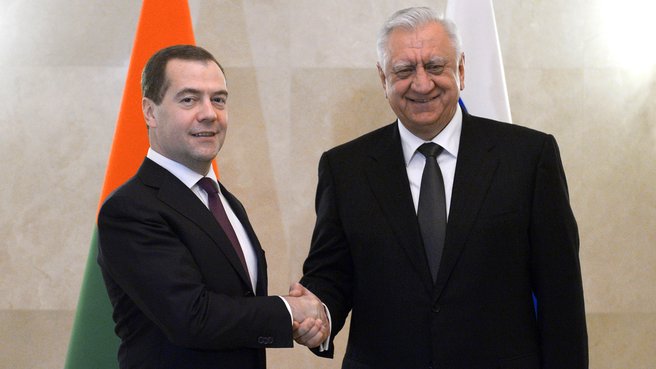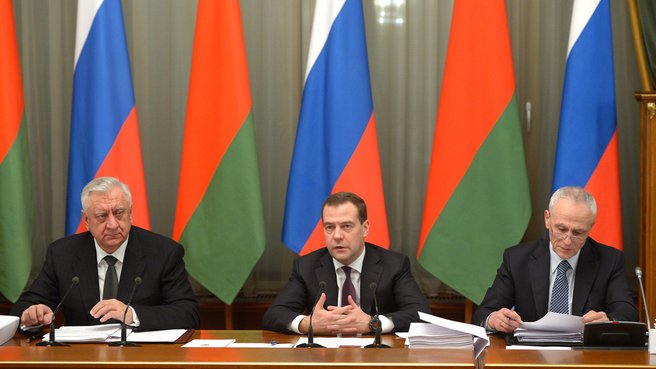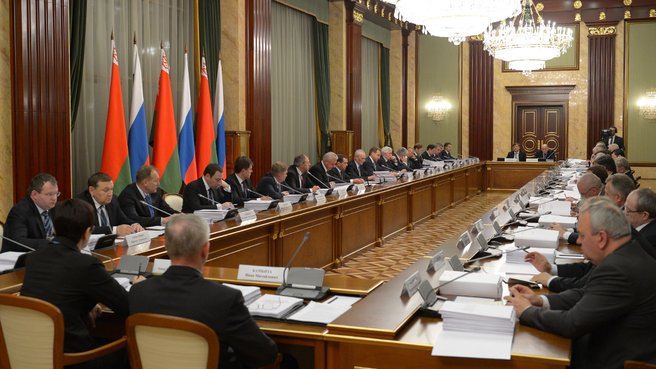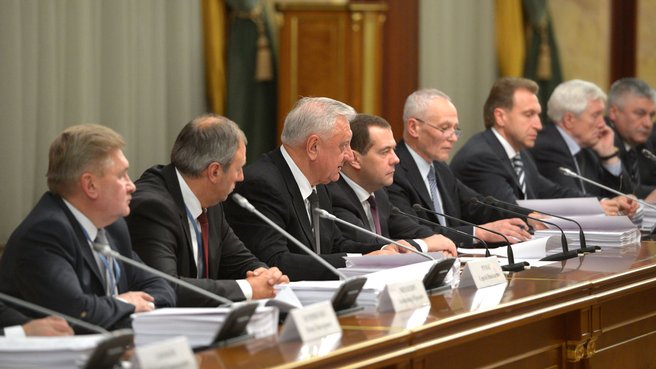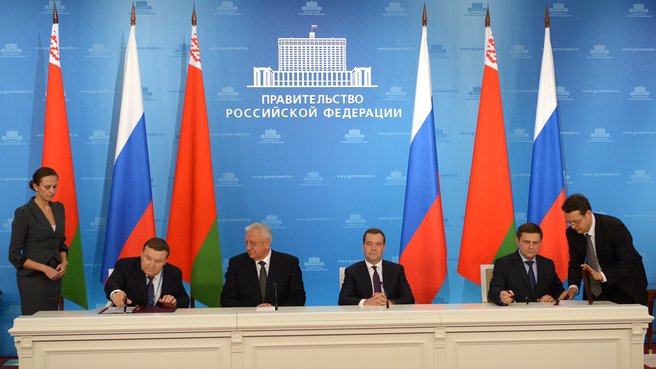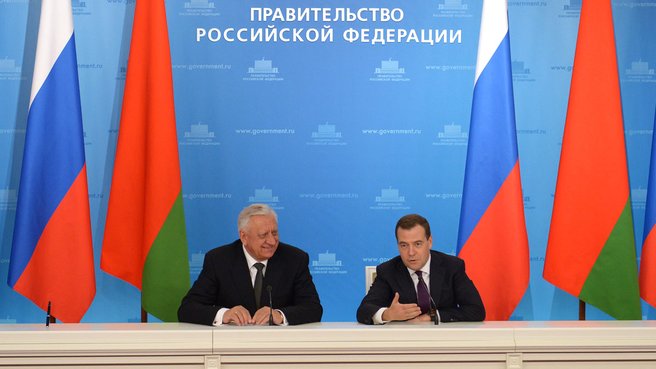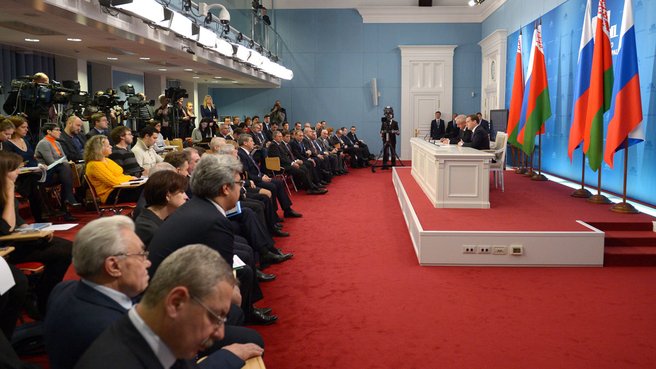“The budget of the Union State is expected to approach five billion roubles next year. The bulk of it will be spent on bilateral cooperation in the real economy – industry, energy, construction, agriculture, transport and communications.”
Meeting of the Union State Council of Ministers
Joint press conference by Dmitry Medvedev and Mikhail Myasnikovich
A meeting between Dmitry Medvedev and Prime Minister of Belarus Mikhail Myasnikovich followed by expanded Russia-Belarus intergovernmental talks took place before the meeting of the Union State Council of Ministers.
Transcript:
Dmitry Medvedev: Good afternoon, distinguished colleagues. Welcome to Moscow for this regular session of the Council of Ministers of our Union State. We have a packed agenda for today of about three dozen items on promoting bilateral cooperation and building the Union State.
Mikhail Myasnikovich and I have discussed a number of issues one-on-one, and later in an expanded format, so now let’s continue the conversation with all the members of the Belarusian and Russian governments. A number of issues should be analysed, including bilateral trade. Last year, the trade balance and trade volumes were in the black, but this year, unfortunately, we are seeing a contraction of about 11%. The situation should not be overdramatised, since there is a reason for it. Unfortunately, the negative trends in the global economy, above all Europe, have spilled over into the economies of Belarus and Russia.
Our task is to try to grab hold of positive trends and to continue to develop in this manner next year. I am positive that this is possible, especially if we work together systemically. We certainly need to take advantage of all the benefits of our joint project, consistently lower administrative barriers, support our companies and businesses, prevent obstacles from hindering their development, promote cooperation in all spheres, including trade and economic ties between regions, and also increase exports of our goods to other markets.
Dmitry Medvedev: "There are some interesting things, some breakthroughs, including high-tech cooperation, such as space exploration, and Belarus is our partner in this sphere."
I’d like to remind you that we have big expectations for our major integration projects in energy, automobile manufacturing, electronics and information. We have discussed them many times, and we did so again today. Unfortunately, we’ve had to admit that progress in some areas has not been quick, but positive results are probable in some spheres. I hope this will happen in the immediate future if we work purposefully to ensure results, but we must also remember that not everything we have done to this point has been faultless or done at the most advanced level technologically. We should act in accordance with the economic environment and think how to use our industrial potential best. There are some interesting things, some breakthroughs, including high-tech cooperation, such as space exploration, and Belarus is our partner in this sphere. We have good prospects in information programmes and the military-technical sphere. I hope we’ll continue working in these fields next year.
The budget of the Union State is expected to reach five billion roubles next year. The bulk of it will be spent on bilateral cooperation in the real economy – industry, energy, construction, agriculture, transport and communications. The budget will pay for about 40 approved programmes and events of the Union State.
We continue to pay attention to the cultural sphere. Expanding cultural exchanges, sports events and youth meetings is highly important and makes it possible to maintain an atmosphere of trust. New initiatives were launched this year and we hope there will be more next year.
Dmitry Medvedev: "The budget of the Union State is expected to reach five billion roubles next year. The bulk of it will be spent on bilateral cooperation in the real economy – industry, energy, construction, agriculture, transport and communications. The budget will pay for about 40 approved programmes and events of the Union State."
I’d like to make a special mention of the preparations for the 70th anniversary of victory in the Great Patriotic War and the 70th anniversary of Belarus’s liberation from the Nazi invaders. This is our common victory and cannot be devalued by anyone. To the contrary, we should make a point of emphasising the importance of what our fathers, our predecessors, did for our homeland at this time of trial. We have a plan of events for the next two years on our agenda.
Today we’ll also sum up the results of the implementation of the Programme of Foreign Policy Action in 2012-2013, and we’ll adopt a similar programme for the next two years.
We are tackling current issues of Russian-Belarusian cooperation, which we’ve been discussing since the morning. We’ve also discussed how often we should meet and hold sessions of the Union State’s Council of Ministers. I think we should meet as often as necessary. If we have what to discuss – for instance, industrial cooperation – or some joint decisions to adopt, we should meet more often. Other cases will require other forms of work that have become relevant recently. I’m referring to the High-Level Group, in particular. It has done much for cooperation between our ministries and departments and its performance has been very positive. We should make active use of all this as we work toward our common goals.
I wish successful work to all of you and am giving the flow to my colleague Mr Myasnikovich:
Mikhail Myasnikovich: Thank you very much.
Mr Medvedev, esteemed members of the Union Council of Ministers and all those present.
Today is one year since the last meeting of the Union State Council of Ministers. This is not good news actually. I believe that the standing committee should be convening such meetings more frequently. Mr Medvedev and I agreed to hold meetings of the Union State Council of Ministers on a regular basis. We should get together and address important issues.
In fact, Mr Medvedev and I have looked into issues of bilateral relations on five separate occasions this year. We held constructive meetings and addressed important issues of our relations within the union. However, since the Union State Council of Ministers and our bilateral relations generate most ideas with regard to other integration associations, we will strive to make relations between Russia and Belarus more systematic and regular.
Mikhail Myasnikovich: "Mutual trade is an objective indicator of the economic integration level. Russia remains Belarus’ key trade partner."
We should join our efforts in the face of the global commodity and financial competition. I support the proposals made by Mr Medvedev in the sphere of industry, agroindustry, the pharmaceutical industry and other important industries.
We have removed numerous obstacles in bilateral trade. However, I share the opinion that the process of uniting the industrial and financial capitals is moving slowly. Mr Medvedev and I have agreed on policy approaches regarding the schedule of our work and the division of responsibilities.
We also believe that the service market could do much better. Companies from third countries are expanding their presence on our common market. Competition is a good thing, but we must support domestic producers and protect our state interests.
I believe that we should improve the efficiency of our standing committee as a body representing the Union State. The standing committee should make important issues that require the attention of the Government and economic agents part of our agenda. We don’t have such issues on the agenda at the moment. They are being considered by Russian and Belarusian prime ministers and deputy prime ministers and by the Shuvalov-Roumas High-Level Group (Igor Shuvalov, First Deputy Prime Minister of the Russian Federation, Sergei Roumas, Board Chairman, Development Bank of the Republic of Belarus) which I would like to thank for the constructive and fruitful work. .
Mutual trade is an objective indicator of the economic integration level. Russia remains Belarus’ key trade partner. We appreciate this, and are explaining it in the media. Belarusian society has formed a stable opinion about the efficiency of union relations. People appreciate and support the positive dynamics of union cooperation.
Mikhail Myasnikovich: "The relatively small nation of Belarus occupies sixth place among Russia’s foreign policy partners. Last year our trade reached a record $44 billion."
The relatively small nation of Belarus occupies sixth place among Russia’s foreign policy partners. Last year our trade reached a record $44 billion. We must step up our work, because this figure has decreased a bit today, as Mr Medvedev just mentioned it.
I’d like to say a few words about investment. Russian companies have invested $5.14 billion in the Belarusian economy, and Belarusian companies have invested about $2 billion in the Belarusian economy. Seven banks controlled by Russian capital are operating in Belarus today. They account for a quarter of all Belarusian assets. We also have over 2,500 companies with Russian capital working in Belarus.
Mr Medvedev, members of the Union Government, we are carrying out over 20 joint investment projects. And as I said, Belarusian investment in Russia stands at about two billion dollars, including $1.6 billon of direct investment. About 1,000 joint ventures with Belarusian capital are operating in Russia. I believe their number may increase. The Union Council will create comfortable conditions for this. Let’s turn to our agenda. Thank you for attention.
Dmitry Medvedev: Thank you very much, Mr Myasnikovich.
* * *
Several joint documents signed in the presence of Dmitry Medvedev and Mikhail Myasnikovich
Signed documents:
- agreement between the Government of the Russian Federation and the Government of the Republic of Belarus on cooperation in the use and the development of the Russian Global Navigation Satellite System GLONASS;
- agreement between the Government of the Russian Federation and the Government of the Republic of Belarus on early notification of a nuclear accident and the exchange of information in the field of nuclear and radiation safety;
- agreement between the Government of the Russian Federation and the Government of the Republic of Belarus on cooperation in the field of aviation search and rescue operations;
- protocol between the Government of the Russian Federation and the Government of the Republic of Belarus on extending the agreement of 9 December, 2010 on the procedure governing the payment and receipt of export customs duties (other duties, taxes and fees having equivalent effect) when exporting crude oil and certain goods produced from petroleum from the territory of the Republic of Belarus beyond the customs territory of the Customs Union.
* * *
Dmitry Medvedev and Mikhail Myasnikovich hold a joint press conference following the meeting of the Union State Council of Ministers
Transcript:
Dmitry Medvedev: Ladies and gentlemen, in the interest of saving time, Mr Myasnikovich and I agreed that we won’t make long opening speeches.
At the meeting of the Union State Council of Ministers we described what is taking place in our economies and the potential we have. The only thing that I’d like to add that was not mentioned at the meeting’s opening was that our cooperation is making headway and this year Belarus became our biggest foreign trade partners in the CIS. The Republic of Belarus accounts for one third of our foreign trade with all CIS countries, which puts it at the very top. I mention this to emphasise once again the importance of our cooperation. Ukraine is now in second place.
There is one more piece of news that was mentioned but not officially announced. I still think the media should know about it: even if we do not count oil and some other energy products, whose prices are subject to change, our trade is growing and this is a good sign. Having mentioned these two positive issues, I’d like to finish my speech. If Mr Myasnikovich does not have anything extraordinary to say, we could give journalists the opportunity to ask questions.
Question: Thank you. Good afternoon, Mr Medvedev. Good afternoon, Mr Myasnikovich. I’d like to ask you a question about the Union State. You said today that it does not frequently hold summits. Mr Myasnikovich also mentioned this with regret. This year, you met more than once and discussed questions pertaining to the Customs Union, or the CIS. You reviewed different issues and not all of them were pleasant. I’m referring to dairy products and Baumgertner. Don’t you have the impression that the idea of the Union State is falling to pieces? If not, what is it going to be like? Will you have a common currency or a common government body? It is hard to imagine anything like this today.
The future Union State has another problem – the aesthetic one. There are protests on Kiev’s Maidan Square today and many young people told me when I asked them that they are not protesting against Russia, but rather against a return to the Soviet past. Many people my age and I have the same feeling about the Union State. It reminds us of the worst things associated with the deceased Soviet Union. How will you explain the need for such deep integration to the future generations of Russia and Belarus? Thank you.
Dmitry Medvedev: To begin with, this was not a summit but a high-level meeting. Summits are conducted by the Supreme State Council. This is the first point.
Second. We do meet regularly and not necessarily in the format of the Union State Council or Union State Cabinet of Ministers. We have many reasons to meet. Mr Myasnikovich and I have just met in Uzbekistan and discussed our bilateral relations. We also meet in other places, for instance, Kazakhstan. Topics are not always pleasant, but they are different and this is absolutely normal. The main thing for partners is to discuss everything in the open and this is exactly what we are doing. My Belarusian counterpart and other colleagues will testify that we are never shy of asking difficult questions. This is what partnership is about. It would be worse if we got offended, stopped talking and did not do anything to improve things. But we don’t – we’re discussing all sorts of issues. Far from all of them become public knowledge, but after all there are diplomatic receptions and confidential talks.
Now I’ll get to the gist of the question – about the future of the Union State. Your question to Mr Myasnikovich and I evoked some memories. I remember how I just came to Moscow for a government job in December 1999. By the way, I worked in this building as the deputy head of the Government Executive Office. One of the first documents that I was asked to look at as a young government official and a lawyer who hadn’t yet lost his legal knowledge was this treaty on the formation of the Union State. It was signed in December 1999. I read it with great interest because this was a real breakthrough in relations between two independent states that once were part of the same country, by any yardstick.
Fourteen years have passed since then. There were many ups and downs but I believe that what has been done is important for the destinies of these two peoples – Russians and Belarusians, who are close and fraternal peoples. Indeed, we don’t have a common currency and we recall this from time to time. Is it possible to have one? I believe that it is possible to have a common currency in the future but whether we need one now is a big question. For instance, 10 years ago, we all would have said that we should do this, that this would be useful if we considered all of the nuances linked with the use of one currency – the Russian rouble was mentioned usually in this context.
However, we are now watching complicated processes on the currency market. We appreciate the stability of our rouble, which is a hard currency – something that is forgotten for some reason.
Looking at Europe and the euro, we should reach certain conclusions. Our European colleagues keep telling us: “We’ve rushed. We’ve taken too many states into the Eurozone. Not all economies were ready for this. We’ve made strong currency that serves weak economies.”
Our task would have been much simpler because the union consists of only two states. Nonetheless, I’d like to emphasise that any currency union or a switch to common currency implies very close integration. This should be done when all consequences are considered. Probably, this should be done at the very end – so as simply not to create problems.
Common government bodies, judiciary, and parliament… I’ve already had to answer this question. No matter what is said, the extent of our economic integration is the highest. I quoted the figures to buttress this. Even the Customs Union that we’ve established and the Eurasian Economic Union that we are creating have to cover a long road before reaching the level of the Union State for all its shortcomings.
As for the future, I don’t know. Let’s wait and see. You have made some allusions and recalled Ukraine. I’m not sure that everything that is now taking place in Ukraine may be described as anti-Soviet protests. I have the right to speak about this as I lived in the Soviet era and I know the achievements and the failures of the Soviet system. I’m critical about it, but this is my Motherland, a country where I was born and where I studied.
All statements by people who haven’t lived a single day in the Soviet Union are based on books or memoirs, and I don’t consider them accurate. It would be absolutely wrong to describe our union as the one oriented towards the Soviet past. This is absolutely untrue. Nothing can be brought back – the Soviet Union doesn’t and won’t exist. Our countries and people are different. This is simply impossible.
As for Ukrainian society, I think that it should overcome the tectonic split that has emerged in it because it is threatening the stability and existence of Ukraine as a state. We are watching with anxiety the developments in Ukraine and want all emotions displayed now by Ukrainian civil society to subside. We want our Ukrainian friends to resolve all of their problems themselves and arrive at a consensus – a consolidated decision. We don’t want anyone to interfere with these efforts or deprive them of sovereignty. Trips by a number of European Union representatives to areas swept by disturbances where unsanctioned rallies are being held are nothing but a crude interference in the domestic affairs of a sovereign state. However, it’s up to our Ukrainian partners to decide whom to invite and whom not to invite. Anyway, it looks wild when ministers or European commissars are taking to the square. I think that it is impermissible to behave like this in the 21st century.
Mikhail Myasnikovich: I’d like to point out that the issues of integration at different levels are part of the government policy of the Republic of Belarus. These are not just words, but a consistent policy in the economy and other fields. I was very pleased to read Mr Medvedev’s article on the Constitution published two days ago. In his address to the Federal Assembly, Mr Putin also paid much attention to integration. This shows that nobody is trying to gain some unilateral advantages, or speak about a popular issue. Integration has really become part of Government policy and life.
As for economic issues that I know better, let me repeat what I’ve already said today. We have 3,500 joint ventures (sic!). There are 2,500 Belarusian-Russian residents in the Republic of Belarus and over 1,000 in the Russian Federation. Naturally, they want our governments to create comfortable conditions for their normal operation and we are obliged to do this. At our regular meetings with Mr Medvedev, we are discussing both current questions raised from below and issues concerning the future. We believe billions of dollars of Belarusian investment in Russia and even bigger Russian investment into Belarus, considering different potentials, are not yet sufficient if we consider our integration irreversible.
Have we overcome all our problems? Certainly not. There are some shortcomings in trade. We don’t yet have a common market and there are problems with the markets of services and labour. As for common currency, I completely share Mr Medvedev’s opinion. Here’s an example. We have a currency exchange in Belarus and settlements, quotes and payments for contracts are actively made in Russian roubles – top bank managers that are present here know this well. This is a step, or several steps towards the formation of the currency union. Instead of creating some mythical union state automatically, we should resolve all issues step by step in the four areas that I mentioned – goods, services, human capital and the currency union.
As for dreadful Soviet past… There were very many good things in the Soviet Union and we shouldn’t ignore them completely. However, life is moving on and requires new approaches, market relations, and efficient economic laws. The Union State Council of Ministers is working towards this end.
Question: Thank you. The Belarus-1 TV Channel. Could you explain what determines the signing of oil balances? We’ve seen that they are signed every quarter this year, but each time this is a long story. What is the reason for this? And, also what about tentative figures for 2013 and prospects for 2014? Thank you.
Dmitry Medvedev: Whom are you asking?
Remark: Both prime ministers.
Dmitry Medvedev: This is how you should put it. Otherwise, we may think that you’re asking the audience. Mr Mysnikovich, go ahead please.
Mikhail Myasnikovich: For you to get the correct idea, let me say that when we talk about oil balances, this does not mean that somebody has given or supplied something to someone. Belarus buys Russia’s oil. For oil companies that are selling it to Belarus this is a premium market. We are discussing amounts and agreed today to try to sign next year’s balance in December. We are asking for 23 million barrels. Having considered their potentialities, our Russian colleagues offer 21 million barrels but don’t close the subject to bring these figures closer. However, we’ve agreed today and I believe that this will be confirmed that we’ll get 5.75 million barrels of oil in the first quarter, or 25% from the annual figure of 23 million.
We’ve discussed a fairly delicate subject on the exports of oil products from duty-free Russian oil. Today, we’ve signed a protocol that regulates all of these things. So, we have the legal foundation and must just come closer to the amount figures.
Dmitry Medvedev: I’ll just add that the scale of oil supplies depends on the market situation, and this is normal. We don’t have any control figures, or tough restrictions on balances. We are striking an agreement depending on the requirements. Naturally, Belarus calculates how much oil it needs and we look at our potentialities. At the end of the day, this is a question that concerns agreements and signed contracts. However, it is important to keep this market transparent. We must understand what is happening there with Russian oil products supplied to Belarus, what amount of Russian oil is processed, and what comes back to us as petrol. It is necessary to prevent any abuse on the market because we are partners, but there are always people who want to make more money by fiddling with the rules. We must slap such people on the wrist to prevent them from doing so. We have agreed with our Belarusian partners on this as well. As for the specific amounts of oil, Mr Myasnikovich has already precisely answered this question.
Is this all? Thank you very much and goodbye.
Mikhail Myasnikovich: Thank you.
Dmitry Medvedev: Happy New Year!
